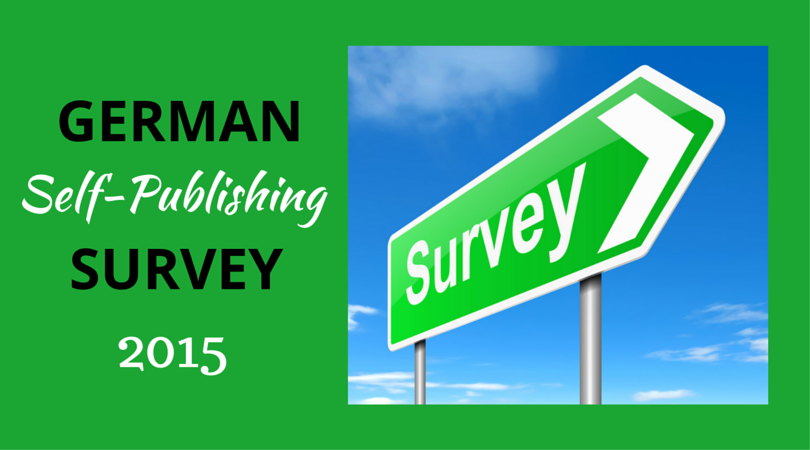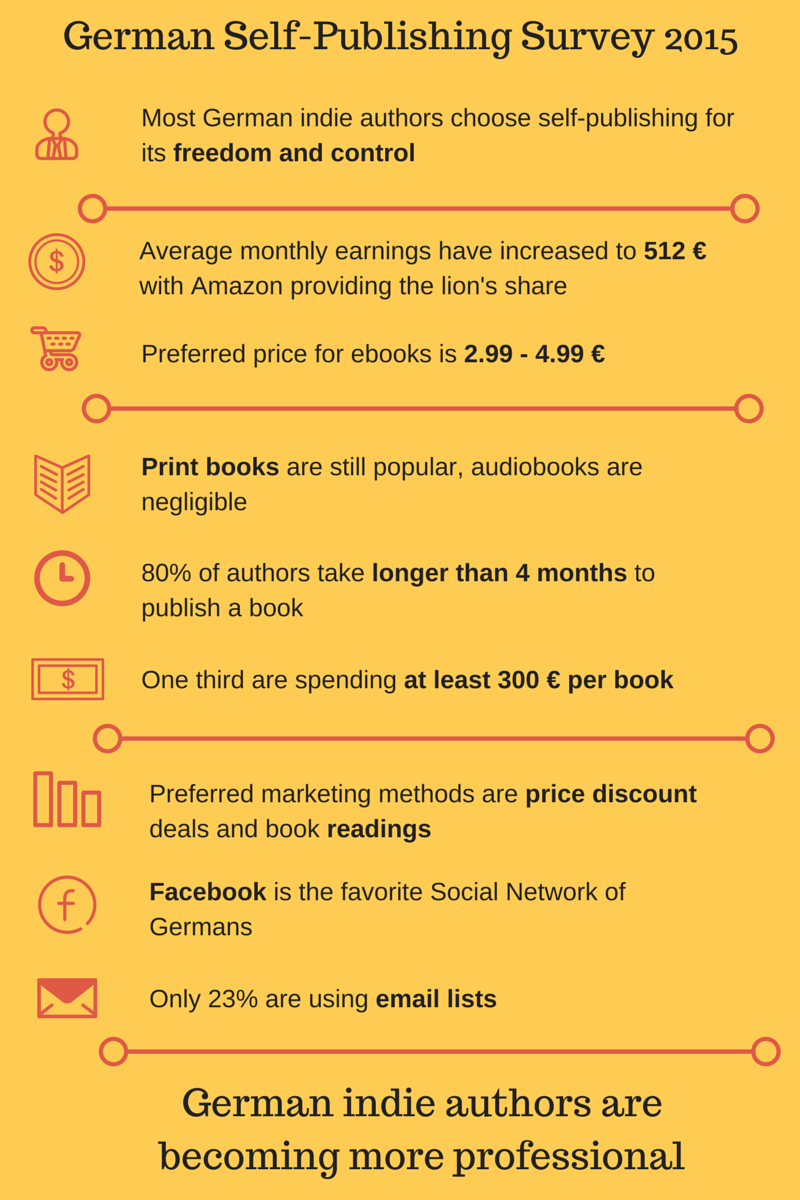The German Self-Publishing Survey 2015 – Summary
Almost 1000 participants have answered the 50 questions of the very comprehensive German Self-publishing Survey 2015 and the results have now been published on the Selfpublisherbibel.de. Let me give you a quick summary of the most interesting findings. If you want to see a visual summary, skip right to the bottom of the post.
First of all: Who are these authors?
The average age of the study participants is 47 years. About 50% of them are between the ages of 36 to 55 with a slight dominance of female authors (57%). Almost half of all participating authors have a university degree.
The majority (62%) of the study participants have published 1-5 books and have been involved with self-publishing for more than 1 year. 22% of indie authors have more than 10 books under their belt.
How and why do authors self-publish in Germany?
Most authors choose self-publishing because of the freedom and control it provides. Not getting a publishing contract has become less important as a reason. The percentage of indie authors who never worked with a traditional publisher is rising from year to year (now 60%) as is the percentage of authors who never even tried to find a publisher (35%). Around 80% would not, however, say no to a publishing contract if the conditions were right.
Publishing directly on the platforms of the online retailers (KDP, Apple, etc.) is gaining in popularity compared to using a distributor, although 60% of authors still prefer an aggregator service. The favorite distributors German authors use are Bookrix and BoD. See a list of distributors here. 5% of authors run their own shops.
30% of the participants are in KDP Select, mostly to profit from increased visibility on Amazon. 15% of authors would not use KDP Select because of the required exclusivity.
How much do they earn?
The average earnings of German indie authors have increased compared to previous years from 312 EUR in 2013 to 512 EUR/month in 2015. While 45% of authors earn less than 50 EUR/month, 11% can say that they make a decent living with their writing (income of more than 1000 EUR/month).
Amazon is still the undisputed leader in terms of sales share for indie authors with about 72% of income from their platform. Tolino makes up 18%, Apple about 10%.
The preferred price point for indie books is in the range of 2.99 to 4.99 EUR. Almost 30% of authors are pricing their books higher than 5 EUR, while only 10% put out 1.99 or 0.99 EUR titles.
Which formats do they publish in?
Print books (both paperback and hardcover) have gained in popularity since 2014, probably because of improved conditions of print on demand services. Since Germans still have a high percentage of print book readers, it’s definitely worth considering. The favorite print on demand service is Create Space.
Audiobooks are negligible because services like ACX are not yet available for German authors.
Almost 10% of German self-publishers have already published in a different language and 29% are at least considering translations. The majority would only do it if somebody else takes care of the translation and marketing aspects.
How do they produce books?
Are indie authors really fast writers? Less than 5% of the authors indicated they are able to write and publish a book in 2 months or less. But 80% of them need longer than 4 months, 29% even longer than one year.
Selfpublishers are becoming more professional. The percentage of authors who want to spend next to nothing on a book has decreased by 10%, and one third of them is spending at least 300 EUR per book, about the price of a professional cover. In parallel, not surprisingly, authors are also out-sourcing more tasks such as cover design, editing, proofreading, and ebook formatting.
What’s their preferred marketing tactic?
Marketing-wise, most German selfpublishers rely on word of mouth, social networks, and their own website or blog.
About 30% of the authors use price discounts or book readings to promote their books. Only 23% are currently using newsletters to build their fan base. About the same percentage of authors is trying their hands in paid advertising or is giving away free books as well as being active on Goodreads or LoveleyBooks.
In terms of social media, Facebook is in the lead with 72% of authors using it to share their work and socialize with their fans. Twitter and Google Plus are the runner-ups (36% and 34%, respectively). Instagram has only been discovered by about 9% of authors (compared to 15% Pinterest users).
What do German indie authors read and write?
Among the participants of the survey, most write in the Fantasy genre (28%) and Contemporary literature (25%), followed by nonfiction and chick lit (20% each), mysteries and children’s and YA books (18%). Erotica and thriller authors make up about 15%.
The majority (63%) of authors read only 1 to 3 books a month. About 17% are voracious readers who plow through more than 5 books a month.
45% read mostly print books and only 20% prefer ebooks. However, this percentage is still higher than the average market share of ebooks in Germany in 2014 (about 5%). The preferred way to consume ebooks is on the Kindle (41%), PC (32%), or smartphone (19%).
Two thirds of the participants read books of other indie authors at least sometimes, or even regularly.
Summary
In general, the indie movement in Germany is catching up to the American market. Authors are starting to approach their publishing business more professionally, which is reflected in higher prices for ebooks and increased average earnings. New authors are constantly discovering selfpublishing and are slowly moving away from traditional publishing, although many still consider a traditional deal to be more prestigious and better for book store distribution and marketing. With respect to online marketing, German authors might still underestimate the power of mailing lists for their long-term strategy.



